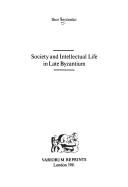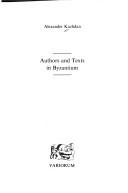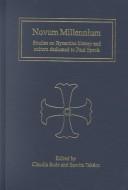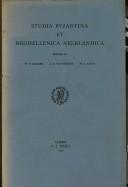| Listing 1 - 10 of 125 | << page >> |
Sort by
|
Book
Year: 1961 Publisher: Oxford: Clarendon press,
Abstract | Keywords | Export | Availability | Bookmark
 Loading...
Loading...Choose an application
- Reference Manager
- EndNote
- RefWorks (Direct export to RefWorks)
Book
Year: 1990 Publisher: Cambridge New York Melbourne Cambridge University Press
Abstract | Keywords | Export | Availability | Bookmark
 Loading...
Loading...Choose an application
- Reference Manager
- EndNote
- RefWorks (Direct export to RefWorks)
Book
ISSN: 17707609 ISBN: 9782916716305 2916716300 Year: 2012 Volume: 35 Publisher: Paris Achcbyz
Abstract | Keywords | Export | Availability | Bookmark
 Loading...
Loading...Choose an application
- Reference Manager
- EndNote
- RefWorks (Direct export to RefWorks)

ISBN: 086078083X 9780860780830 Year: 1981 Volume: CS137 Publisher: London Variorum Repr.
Abstract | Keywords | Export | Availability | Bookmark
 Loading...
Loading...Choose an application
- Reference Manager
- EndNote
- RefWorks (Direct export to RefWorks)
Byzantine Empire --- Civilization --- Civilization. --- Byzantine Empire - Civilization

ISBN: 0860783626 9780860783626 Year: 1993 Volume: 400 Publisher: Aldershot Variorum Repr.
Abstract | Keywords | Export | Availability | Bookmark
 Loading...
Loading...Choose an application
- Reference Manager
- EndNote
- RefWorks (Direct export to RefWorks)
Byzantine Empire --- Civilization --- -Civilization --- Civilization. --- Byzantine Empire - Civilization. --- Byzantine Empire - Civilization

ISBN: 0684166526 9780684166520 Year: 1980 Publisher: New York (N.Y.) Scribner
Abstract | Keywords | Export | Availability | Bookmark
 Loading...
Loading...Choose an application
- Reference Manager
- EndNote
- RefWorks (Direct export to RefWorks)
Byzantine Empire --- Civilization --- -Civilization --- Civilization. --- Byzantine Empire - Civilization
Book
ISBN: 9782753579835 2753579830 Year: 2020 Publisher: Rennes : Presses universitaires de Rennes,
Abstract | Keywords | Export | Availability | Bookmark
 Loading...
Loading...Choose an application
- Reference Manager
- EndNote
- RefWorks (Direct export to RefWorks)
On peut choisir d'étudier l'Empire romain par le biais des événements généraux, militaires ou politiques, on peut faire l'histoire des grands hommes tels que les sources antiques les ont privilégiés. Mais on peut aussi s'intéresser aux composantes anonymes de la société. Les femmes et les hommes qui ont peuplé villes et campagnes de l'Orient romain sont présentés ici en une période particulière. Pourquoi l'Antiquité tardive ? C'est une époque de bouleversements et de profonds remaniements : le gouvernement impérial devient un dominât, l'État impose des contraintes, vivement ressenties, et l'économie se transforme ; le christianisme modifie les comportements comme les pensées. Ce sont tous les acteurs de cette évolution aux rythmes contrastés, sur fond de relative prospérité générale, que l'on veut évoquer. Les paysans qui se débattent entre aléas climatiques, terroirs ingrats et exigences des grands, les artisans qui produisent, dans les ateliers et les boutiques, objets du quotidien ou du luxe, les commerçants qui sillonnent les routes et les mers de l'Empire. Et aussi les élites, si riches en capital social : fastueux courtisans de Constantinople, puissants propriétaires terriens, notables des cités, forts de leur idéal civique, nombreux fonctionnaires au service de l'État, enfin évêques, nouveaux patrons des communautés. Ces femmes et ces hommes se confrontent ou s'associent, solidaires ou étrangers, puissants ou misérables, mais tous participent à la construction d'une société et d'un système qui, issus de l'empire romain, s'avèrent suffisamment stables pour fonder peu à peu l'Empire byzantin
Book
ISBN: 9783110272062 3110272067 3110272253 3110272261 1283857766 9783110272253 Year: 2012 Volume: 24 Publisher: Berlin : De Gruyter
Abstract | Keywords | Export | Availability | Bookmark
 Loading...
Loading...Choose an application
- Reference Manager
- EndNote
- RefWorks (Direct export to RefWorks)
This volume examines the effects of Byzantine culture on the rest of Europe, from the Middle Ages through the Renaissance, Protestant Reformation, Enlightenment, and up to the present time. The individual contributions cast a new light on different forms of encounter, adaptation, and impact, as well as the cultural clash. They investigate phenomena from literature, philosophy, theology, history, jurisprudence, music, and art, elucidating the ways in which the Byzantine Empire significantly shaped the development of Europe as a transmitter of the Greek, Roman, and Christian cultures.
Europe --- Byzantine Empire --- Civilization --- Byzantine influences --- Byzantine influences. --- Civilization. --- Byzantine Empire -- Civilization. --- Europe -- Civilization -- Byzantine influences. --- Regions & Countries - Europe --- History & Archaeology --- Greece --- Byzantine Empire -- Civilization --- Europe -- Civilization -- Byzantine influences --- E-books --- Europe - Civilization - Byzantine influences --- Byzantine Empire - Civilization

ISBN: 0754604241 9780754604242 Year: 2001 Publisher: Aldershot Ashgate
Abstract | Keywords | Export | Availability | Bookmark
 Loading...
Loading...Choose an application
- Reference Manager
- EndNote
- RefWorks (Direct export to RefWorks)
This volume reflects the different methods and new approaches to the study of Byzantine history that have characterized the work of Paul Speck, to whom it is dedicated, and above all, his insistence on a close reading and careful interpretation of the sources. These aims are encapsulated in the introduction by John Haldon, which gives a sense of where future studies should lead new generations of scholars. The following studies, by many of the leading authorities in their fields, look at a whole range of aspects of the history of Byzantium - its culture, theology, linguistics, literature, historiography, sigillography and art - and at the place of the Byzantine empire within the late antique and medieval worlds. Bibliography; Preface; General introduction, John Haldon; Alexander der Große am Bosporus, Albrecht Berger; Philippos ho stratelates tou basilikou Opsikiou: Anmerkungen zur Frühgeschichte des Thema Opsikion, Wolfram Brandes; Melania, William Brashear; Oracles and earthquakes, Alan Cameron; Les ducs d'Antioche sous Michel IV et Constantin IX, Jean-Claude Cheynet; Der Kaiser, sein Bild und dessen Interpret, Carolina Cupane; Perils of the deep, George T. Dennis; Bitter brine and sweet fresh water, John Duffy; Das Theodosius-Missorium von 388, Arne Effenberger; La pomme de Théodose II et sa Réplique Arménienne, Michel van Esbroeck; Theodora and Evita, Clive Foss; Three authors in search of a reader, Joseph D. Frendo; Philippikos and the Greens, Judith Herrin; Es war die Nachtigall, Wolfram Hörandner; The Venetian quarter of Constantinople from 1082 to 1261, David Jacoby; Icon veneration, Patricia Karlin-Hayter; Parerga zur Ikonographie des Josua-Rotulus und der Illuminierten Byzantinischen Oktateuche, Otto Kresten; "Falsata Graecorum more"?, Erich Lamberz; John III Ducas Vatatzes and the Venetians, John S. Langdon; Bonifatios von Tarsos - ein Verwandter der bekehrten Mimen, Claudia Ludwig; Du consul à l'empereur, Cécile Morrisson, CNRS; Le monastère de la Sainte Trinité à Boradion sur le Bosphore, Nicolas Oikonomides; Nebenterminologie, Topoi, Loci Similes und Quellen in einigen Stellen der Chronike diegesis von Niketas Choniates, Anna Pontani; Palladius, Lausus and the Historia Lausiaca, Claudia Rapp; Political dimensions of Manuel II Palaiologos' 1392 marriage and coronation, Stephen W. Reinert; Zu den diplomatischen Beziehungen zwischen Byzanz und dem Kalifat in der Zeit der syrischen Dynastie (717-802), Ilse Rochow; Those "whose writings were exchanged", Silvia Ronchey; Robert de Clari und Konstantinopel, Peter Schreiner; 'Dog-knights' and 'elulargency', Serge Serikoff; Sigillography in the service of history, Irfan Shahîd; Diplomatie und Propaganda im 9. Jahrhundert, Juan Signes Codoñer, Islamische und byzantinische Geschichtsschreibung, Gotthard Strohmaier; Das Wort barsamekhoumnos im Opsarologos, Dimitri Theodoridis; Faustus "of Byzantium", Procopius, and the Armenian History, Giusto Traina; The Christianization of sexual slander, Martha P. Vinson; Exempla aus der griechischen Geschichte in Byzanz, Eva de Vries-van der Velden; The Greek and Arabic sources on the eight day captivity of the Emperor Romanos IV in the camp of the Sultan Alp Arslan after the Battle of Mantzikert, Speros Vryonis, Jr.
Byzantine Empire --- Civilization --- History --- Civilization. --- History. --- Byzantine Empire - Civilization --- Byzantine Empire - History

ISBN: 9004035524 9789004035522 Year: 1972 Volume: 3 Publisher: Leiden Brill
Abstract | Keywords | Export | Availability | Bookmark
 Loading...
Loading...Choose an application
- Reference Manager
- EndNote
- RefWorks (Direct export to RefWorks)
Byzantine Empire --- Empire byzantin --- Civilization --- Civilisation --- -Civilization --- Civilization. --- Byzantine Empire - Civilization
| Listing 1 - 10 of 125 | << page >> |
Sort by
|

 Search
Search Feedback
Feedback About UniCat
About UniCat  Help
Help News
News